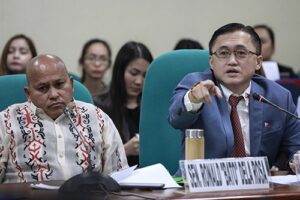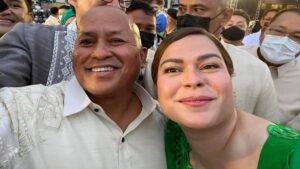A new wave of tension has swept through Philippine political circles following revelations from former Senator Antonio Trillanes IV concerning the ongoing investigation by the International Criminal Court (ICC) into the bloody drug war of the previous administration. Trillanes, an ardent critic of the former President, claimed that an arrest warrant is currently being finalized for two prominent sitting senators, Senator Ronald “Bato” De la Rosa and Senator Bong Go, along with former Philippine National Police (PNP) Chief Oscar Albayalde.
The announcement suggests a significant escalation in the ICC’s probe, moving beyond the direct accountability of the former President and focusing on those alleged to be integral to the policy’s execution and funding.

The ICC’s Potential Indictments: Principals and Evidence
Trillanes, who claims to have maintained contacts within ICC circles during his recent engagements in the Hague, provided a precise assessment of the potential indictments:
Named as Principals: Senators De la Rosa and Go are reportedly the only high-profile figures, aside from former PNP Chief Albayalde, for whom an ICC arrest warrant is imminent. Trillanes stressed that they are being considered as principals in the case, suggesting that the ICC has evidence linking them directly to the commission of crimes against humanity.
The Roles of the Accused: According to Trillanes, the alleged structure of the drug war operation involved distinct roles:
The former President set the policy.
Senator De la Rosa, as then-PNP Chief, implemented the policy through the PNP.
Senator Bong Go, on the other hand, is allegedly implicated as the “pay master,” a key figure in the financial and logistical support of the operations.
The Evidentiary Standard: Trillanes highlighted the strict evidentiary threshold of the ICC, which demands evidence that ensures a “certainty of conviction,” thus limiting the scope of those named in the imminent warrants to the few for whom the case is robust. He clarified that while former Justice Secretary Vitaliano Aguirre’s name may appear in documents, he is not currently a target for a forthcoming warrant.
Timeline for Warrants: The former Senator predicted that the warrants for Senators De la Rosa and Go could be issued as early as February next year (2026), although there is a possibility that it could be sooner.
The Crucial Testimony of Reyna Garma
A significant factor in the ICC’s ongoing case is the expected testimony of former police officer Reyna Garma. Garma, who is currently out of the country and whose arrest has been ordered by a local court in connection with a separate domestic murder case (of former PCSO Board Secretary Wesley Barayuga), is viewed as a “very crucial and substantial” witness.
Linking Bong Go: Trillanes emphasized that Garma’s testimony is particularly critical for the case against Senator Bong Go. The overall scheme is described as having two distinct tracks: the “regular operations” executed through the PNP (linked to the former President and De la Rosa) and a “special operations” track, allegedly involving a death squad built under Go’s supervision. Garma is purported to have been consulted in the building of this squad, which targeted rivals, including Chinese drug lords and “ninja cops” not part of their network.
ICC Protection for Witnesses: Despite the local arrest order against Garma, Trillanes expressed confidence in the security of her testimony. Citing the case of another ICC witness, Arturo Lascañas, he noted that the ICC, through its cooperation agreement with Interpol, can override a “red notice” issued by a member country. This mechanism ensures that witnesses in ICC cases are protected from harassment or extradition efforts orchestrated by governments from which they are testifying. Trillanes affirmed that Garma has already been preliminarily interviewed and assessed as an essential witness against the former President and is currently in a “safer place” outside of Malaysia.
Senator De la Rosa’s Counter-Response
In an immediate response to the news, Senator De la Rosa vehemently dismissed Trillanes’ claims, suggesting that the former senator’s urgency is motivated by a perceived lack of funding and political support. De la Rosa, however, is reported to be in a state of apprehension following the revelation.
The Senate’s Plea for “House Arrest” for the Former President
Amidst the ICC’s preparations, the Philippine Senate adopted a controversial resolution urging the ICC to allow “house arrest” for the former President in the Philippines. Trillanes, however, dismissed the resolution as a purely symbolic, politically motivated gesture with no practical effect on the ICC.
No Legal Bearing: Trillanes asserted that the resolution is meaningless as the Philippines is no longer a member of the ICC, having withdrawn under the former administration. Only ICC member-states can host a detainee for interim release, as they are obligated to surrender the individual for trial upon the Court’s demand.
Political Calculation: He suggested the resolution is aimed at placating supporters of the former President’s daughter, Vice President Sara Duterte, particularly those in Mindanao, and providing “receipts” for Senators looking ahead to the 2028 elections.
Refuting “Inhumane” Detention Claims: Trillanes also addressed the former President’s camp’s claims of “inhumane” detention and a reported incident where he was found “unconscious.” Trillanes stated that his information, gathered from his contacts, indicates that no such medical emergencies occurred. He stressed that the ICC detention center is “first-class,” providing comfortable amenities, 24/7 medical access, and unlimited visitation rights, debunking the narrative of ill-treatment.
Destabilization Attempts and Political Volatility

Trillanes also offered a rare glimpse into the political maneuvering surrounding the former President’s detention, revealing that the delay in the confirmation of charges hearing was reportedly due to the confidence of the Duterte camp that President Ferdinand “Bongbong” Marcos Jr. would be ousted by September 2025.
The September 21 Plan: The former senator claimed that the Duterte camp hoped the genuine September 21 rallies against the flood control scandal would be co-opted, gather a “critical mass” leading to a “withdrawal of support” from the Armed Forces of the Philippines (AFP), and ultimately install Vice President Duterte in a scenario similar to the EDSA People Power Revolution.
Active Threat: While the initial plan failed, Trillanes warned that the political environment remains volatile and susceptible to another “political impasse.” He named a group of “retired generals” and others actively pushing for the Duterte return, but credited the active service forces for remaining loyal to the Constitution.
Vulnerability of the Marcos Administration: Trillanes assessed the current political climate as being close to a “pre-EDSA” environment due to the gravity of the flood control scandal. He critiqued the Marcos administration’s handling of the crisis, pointing to an initial lack of narrative control and the influence of advisers with “dual allegiance” who allegedly steered the President toward internal conflict (such as the impeachment attempt against the Vice President), weakening his position against the Duterte camp.
The Magalong Controversy
Finally, Trillanes addressed his long-running issue with former Special Adviser to the DPWH and former Baguio City Mayor Benjamin Magalong, who recently resigned. Trillanes questioned Magalong’s impartiality while serving on the Independent Commission for Infrastructure (ICI), citing:
Conflict of Interest: Magalong’s self-admitted allegiance to the Duterte and Bong Go camps, who are the “kingpins” in the DPWH syndicate scandal, immediately compromises his objectivity in any investigation.
Controversial Project: Trillanes flagged a $\text{P}120$ million tennis court project linked to Magalong and the Disca family, questioning its cost and the potential for a conflict of interest, especially given Magalong’s role in probing the very kind of projects under scrutiny.
Destabilization Link: He further alleged that Magalong is part of a group of six prominent figures actively pushing for a “National Council” to replace the democratically elected government, positioning Magalong as a potential “transition leader.” Trillanes asserted that such a posture renders the ICI susceptible to being used for destabilization against the current administration, by focusing the investigation primarily on present-day issues while shielding the alleged corruption of the past regime.





